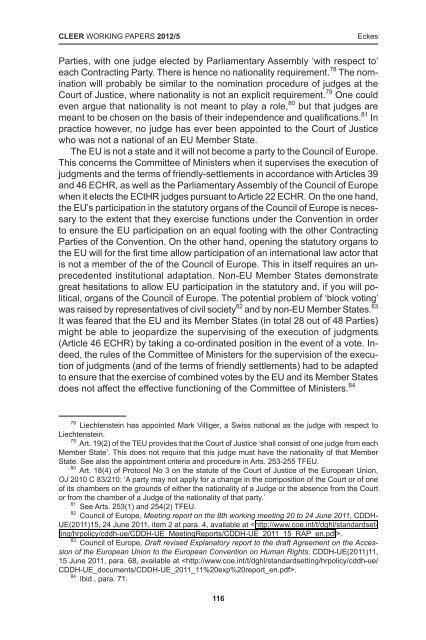Principles and practices of EU external representation - TMC Asser ...
Principles and practices of EU external representation - TMC Asser ...
Principles and practices of EU external representation - TMC Asser ...
Create successful ePaper yourself
Turn your PDF publications into a flip-book with our unique Google optimized e-Paper software.
CLEER WORKING PAPERS 2012/5<br />
Eckes<br />
Parties, with one judge elected by Parliamentary Assembly ‘with respect to’<br />
each Contracting Party. There is hence no nationality requirement. 78 The nomination<br />
will probably be similar to the nomination procedure <strong>of</strong> judges at the<br />
Court <strong>of</strong> Justice, where nationality is not an explicit requirement. 79 One could<br />
even argue that nationality is not meant to play a role, 80 but that judges are<br />
meant to be chosen on the basis <strong>of</strong> their independence <strong>and</strong> qualifications. 81 In<br />
practice however, no judge has ever been appointed to the Court <strong>of</strong> Justice<br />
who was not a national <strong>of</strong> an <strong>EU</strong> Member State.<br />
The <strong>EU</strong> is not a state <strong>and</strong> it will not become a party to the Council <strong>of</strong> Europe.<br />
This concerns the Committee <strong>of</strong> Ministers when it supervises the execution <strong>of</strong><br />
judgments <strong>and</strong> the terms <strong>of</strong> friendly-settlements in accordance with Articles 39<br />
<strong>and</strong> 46 ECHR, as well as the Parliamentary Assembly <strong>of</strong> the Council <strong>of</strong> Europe<br />
when it elects the ECtHR judges pursuant to Article 22 ECHR. On the one h<strong>and</strong>,<br />
the <strong>EU</strong>’s participation in the statutory organs <strong>of</strong> the Council <strong>of</strong> Europe is necessary<br />
to the extent that they exercise functions under the Convention in order<br />
to ensure the <strong>EU</strong> participation on an equal footing with the other Contracting<br />
Parties <strong>of</strong> the Convention. On the other h<strong>and</strong>, opening the statutory organs to<br />
the <strong>EU</strong> will for the first time allow participation <strong>of</strong> an international law actor that<br />
is not a member <strong>of</strong> the <strong>of</strong> the Council <strong>of</strong> Europe. This in itself requires an unprecedented<br />
institutional adaptation. Non-<strong>EU</strong> Member States demonstrate<br />
great hesitations to allow <strong>EU</strong> participation in the statutory <strong>and</strong>, if you will political,<br />
organs <strong>of</strong> the Council <strong>of</strong> Europe. The potential problem <strong>of</strong> ‘block voting’<br />
was raised by representatives <strong>of</strong> civil society 82 <strong>and</strong> by non-<strong>EU</strong> Member States. 83<br />
It was feared that the <strong>EU</strong> <strong>and</strong> its Member States (in total 28 out <strong>of</strong> 48 Parties)<br />
might be able to jeopardize the supervising <strong>of</strong> the execution <strong>of</strong> judgments<br />
(Article 46 ECHR) by taking a co-ordinated position in the event <strong>of</strong> a vote. Indeed,<br />
the rules <strong>of</strong> the Committee <strong>of</strong> Ministers for the supervision <strong>of</strong> the execution<br />
<strong>of</strong> judgments (<strong>and</strong> <strong>of</strong> the terms <strong>of</strong> friendly settlements) had to be adapted<br />
to ensure that the exercise <strong>of</strong> combined votes by the <strong>EU</strong> <strong>and</strong> its Member States<br />
does not affect the effective functioning <strong>of</strong> the Committee <strong>of</strong> Ministers. 84<br />
78 Liechtenstein has appointed Mark Villiger, a Swiss national as the judge with respect to<br />
Liechtenstein.<br />
79 Art. 19(2) <strong>of</strong> the T<strong>EU</strong> provides that the Court <strong>of</strong> Justice ‘shall consist <strong>of</strong> one judge from each<br />
Member State’. This does not require that this judge must have the nationality <strong>of</strong> that Member<br />
State. See also the appointment criteria <strong>and</strong> procedure in Arts. 253-255 TF<strong>EU</strong>.<br />
80 Art. 18(4) <strong>of</strong> Protocol No 3 on the statute <strong>of</strong> the Court <strong>of</strong> Justice <strong>of</strong> the European Union,<br />
OJ 2010 C 83/210: ‘A party may not apply for a change in the composition <strong>of</strong> the Court or <strong>of</strong> one<br />
<strong>of</strong> its chambers on the grounds <strong>of</strong> either the nationality <strong>of</strong> a Judge or the absence from the Court<br />
or from the chamber <strong>of</strong> a Judge <strong>of</strong> the nationality <strong>of</strong> that party.’<br />
81 See Arts. 253(1) <strong>and</strong> 254(2) TF<strong>EU</strong>.<br />
82 Council <strong>of</strong> Europe, Meeting report on the 8th working meeting 20 to 24 June 2011, CDDH-<br />
UE(2011)15, 24 June 2011, item 2 at para. 4, available at .<br />
83 Council <strong>of</strong> Europe, Draft revised Explanatory report to the draft Agreement on the Accession<br />
<strong>of</strong> the European Union to the European Convention on Human Rights, CDDH-UE(2011)11,<br />
15 June 2011, para. 68, available at .<br />
84 Ibid., para. 71.<br />
116

















